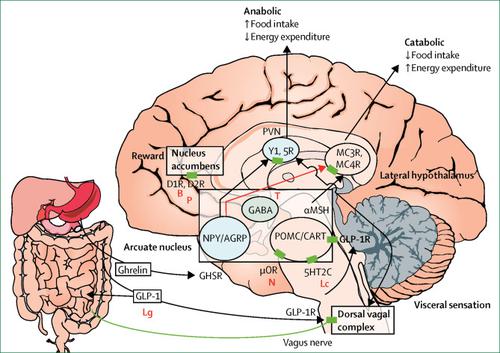Our official English website, www.x-mol.net, welcomes your feedback! (Note: you will need to create a separate account there.)
Progress and challenges in anti-obesity pharmacotherapy.
The Lancet ( IF 168.9 ) Pub Date : 2018-03-01 , DOI: 10.1016/s2213-8587(17)30236-x Daniel H Bessesen , Luc F Van Gaal
The Lancet ( IF 168.9 ) Pub Date : 2018-03-01 , DOI: 10.1016/s2213-8587(17)30236-x Daniel H Bessesen , Luc F Van Gaal

|
Obesity is a serious and growing worldwide health challenge. Healthy lifestyle choices are the foundation of obesity treatment. However, weight loss can lead to physiological adaptations that promote weight regain. As a result, lifestyle treatment alone typically produces only modest weight loss that is difficult to sustain. In other metabolic diseases, pharmacotherapy is an accepted adjunct to lifestyle. Several anti-obesity drugs have been approved in the USA, European Union, Australia, and Japan including sympathomimetics, pancreatic lipase inhibitors, GABAA receptor activators, a serotonin 2C receptor agonist, opioid antagonist, dopamine-norepinephrine reuptake inhibitor, and glucagon-like peptide-1 (GLP-1) receptor agonists. These drugs vary in their efficacy and side-effect profiles but all provide greater weight loss than do lifestyle changes alone. Even though obesity is widespread and associated with adverse health consequences, and anti-obesity drugs can help people to lose weight, very few patients use these drugs partly because of concerns about safety and efficacy, but also because of inadequate health insurance coverage. Despite great advances in our understanding of the biology of weight regulation, many clinicians still believe that patients with obesity should have the willpower to eat less. The tendency to hold the patient with obesity responsible for their condition can be a barrier to greater acceptance of anti-obesity drugs as appropriate options for treatment. Physicians should be comfortable discussing the risks and benefits of these drugs, and health insurance companies should provide reasonable coverage for their use in patients who are most likely to benefit. Although few promising anti-obesity medications are in the drug-development pipeline, the most promising drugs are novel molecules that are co-agonists for multiple gut hormones including GLP-1, glucagon, and gastric inhibitory peptide.
中文翻译:

抗肥胖药物治疗的进展和挑战。
肥胖症是全球范围内日益严重的健康挑战。健康的生活方式选择是肥胖治疗的基础。然而,减肥可以导致促进体重恢复的生理适应。结果,仅生活方式治疗通常仅产生难以维持的适度的体重减轻。在其他代谢性疾病中,药物治疗是生活方式的公认辅助手段。几种抗肥胖药已在美国,欧盟,澳大利亚和日本获得批准,包括拟交感神经药,胰腺脂肪酶抑制剂,GABAA 。受体激活剂,5-羟色胺2C受体激动剂,阿片样物质拮抗剂,多巴胺-去甲肾上腺素再摄取抑制剂和胰高血糖素样肽1(GLP-1)受体激动剂。这些药物在功效和副作用方面各不相同,但与单独改变生活方式相比,它们都可以减轻体重。尽管肥胖症很普遍,并且与不良的健康后果相关,并且抗肥胖药可以帮助人们减肥,但很少有患者使用这些药物,部分原因是出于对安全性和功效的关注,而且还因为健康保险覆盖率不足。尽管我们对体重调节生物学的理解有了长足的进步,但许多临床医生仍然认为,肥胖症患者应具有吃得少的意志。该趋势将与负责自己的病情可能是一个障碍更大的接受抗肥胖药物作为治疗相应的选项肥胖患者。医生应乐于讨论这些药物的风险和益处,而健康保险公司应为最有可能受益的患者提供合理的使用范围。尽管很少有有希望的抗肥胖药出现在药物开发管道中,但最有前途的药物是新型分子,它们是多种肠道激素(包括GLP-1,胰高血糖素和胃抑制肽)的共同激动剂。健康保险公司应为最有可能受益的患者提供合理的使用范围。尽管很少有有希望的抗肥胖药出现在药物开发管道中,但最有前途的药物是新型分子,它们是多种肠道激素(包括GLP-1,胰高血糖素和胃抑制肽)的共同激动剂。健康保险公司应为最有可能受益的患者提供合理的使用范围。尽管很少有有希望的抗肥胖药出现在药物开发管道中,但最有前途的药物是新型分子,它们是多种肠道激素(包括GLP-1,胰高血糖素和胃抑制肽)的共同激动剂。
更新日期:2018-02-21
中文翻译:

抗肥胖药物治疗的进展和挑战。
肥胖症是全球范围内日益严重的健康挑战。健康的生活方式选择是肥胖治疗的基础。然而,减肥可以导致促进体重恢复的生理适应。结果,仅生活方式治疗通常仅产生难以维持的适度的体重减轻。在其他代谢性疾病中,药物治疗是生活方式的公认辅助手段。几种抗肥胖药已在美国,欧盟,澳大利亚和日本获得批准,包括拟交感神经药,胰腺脂肪酶抑制剂,GABAA 。受体激活剂,5-羟色胺2C受体激动剂,阿片样物质拮抗剂,多巴胺-去甲肾上腺素再摄取抑制剂和胰高血糖素样肽1(GLP-1)受体激动剂。这些药物在功效和副作用方面各不相同,但与单独改变生活方式相比,它们都可以减轻体重。尽管肥胖症很普遍,并且与不良的健康后果相关,并且抗肥胖药可以帮助人们减肥,但很少有患者使用这些药物,部分原因是出于对安全性和功效的关注,而且还因为健康保险覆盖率不足。尽管我们对体重调节生物学的理解有了长足的进步,但许多临床医生仍然认为,肥胖症患者应具有吃得少的意志。该趋势将与负责自己的病情可能是一个障碍更大的接受抗肥胖药物作为治疗相应的选项肥胖患者。医生应乐于讨论这些药物的风险和益处,而健康保险公司应为最有可能受益的患者提供合理的使用范围。尽管很少有有希望的抗肥胖药出现在药物开发管道中,但最有前途的药物是新型分子,它们是多种肠道激素(包括GLP-1,胰高血糖素和胃抑制肽)的共同激动剂。健康保险公司应为最有可能受益的患者提供合理的使用范围。尽管很少有有希望的抗肥胖药出现在药物开发管道中,但最有前途的药物是新型分子,它们是多种肠道激素(包括GLP-1,胰高血糖素和胃抑制肽)的共同激动剂。健康保险公司应为最有可能受益的患者提供合理的使用范围。尽管很少有有希望的抗肥胖药出现在药物开发管道中,但最有前途的药物是新型分子,它们是多种肠道激素(包括GLP-1,胰高血糖素和胃抑制肽)的共同激动剂。



























 京公网安备 11010802027423号
京公网安备 11010802027423号